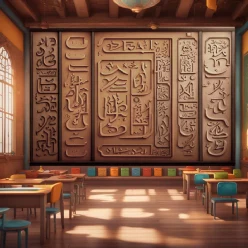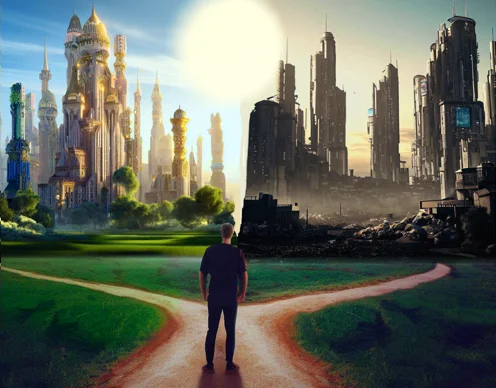Our ancestors had the courage
to change their path
Our emotions cause us to
feel comfortable with the culture that we are accustomed to, and
to be frightened of changes, but, as described in other documents, such
as this,
mimicking our ancestors while we develop technology is resulting in our
culture becoming
increasingly
inappropriate.

Our
ancestors were risking their lives when they first began to farm,
but we will not
risk our lives by making changes to our culture.
|
When our nomadic ancestors decided to become farmers, there must have
been a lot of fear among them to give up nomadic life and try an
activity that they knew almost nothing about.
Furthermore, a lot of the must have failed
as a farmer, which would have increased their fear that farming was a
mistake.
However, it is obvious that some of them learned from their mistakes,
and eventually became successful as farmers.
This constitution advocates making a radical change to our lives, and
this will stimulate our emotion to remain with the culture that we are
familiar, and to look for excuses to avoid making such changes, or to
propose making less radical changes.
Our nomadic ancestors faced starvation
when they became farmers, but all we face by making changes to our
culture is that we make mistakes that need to be altered. We will not be risking
our lives. Furthermore, we are much more educated than our nomadic
ancestors, and we are a much larger group, so there are lots of people
around the world to help us deal with problems. We have much less to
fear than did.
Being afraid to make changes to our culture is as foolish as being
afraid to make changes to the organization of a business, or the rules
of soccer or baseball. We should look forward to making our culture
better, not be afraid of it. We should help one another find enough
courage to explore
a new path in life. We should inspire people, not frighten them.
We need a new attitude towards “courage”
Fighting is such a
necessary
aspect of life for the more advanced animals that they admire and
follow the
male that is the most successful in fighting for dominance, and the
females are sexually titillated by the males who are the best fighters.
Humans inherited the desire to fight. One of our natural reactions to
irritations is to attack the
irritation, so all of us regularly have to struggle to control our
desire to yell, throw objects, or get into fights.
Our culture has evolved for fighting. For example, most of our fiction
material is dominated by fighting, including the romance books and
television programs for women, although women prefer emotional fights.
Most of our recreational activities are essentially fights for
dominance, and some of them are violent and dangerous, such as rugby,
boxing, and slap
fighting.
However, fighting is no longer necessary for us. We no longer need to
carry weapons and fight with
predators, neighboring tribes, or one another. Today most of the
problems we face are intellectual,
so we need to change our attitudes about
which men are "courageous".
We still need men with the courage to defend us from
criminals, Zionist organizations, pedophile networks, and
other destructive people, but today a man should not be considered
"courageous", "brave", or "tough" unless he is able to
listen to and calmly
discuss problems, conflicting opinions, and constructive
criticism.
Furthermore, he should also be able to acknowledge opinions that are
superior to his, and admit to making mistakes.
If a man is capable only of fighting, then he should be regarded
as "violent" or "crude" rather than "courageous".
We must refrain from protecting opinions
Animals are in a deadly
battle for life, so they react to problems by trying
to protect themselves, either
by fighting or by running away. Today the conflicts between
us are intellectual,
so they need to be resolved with discussions, research, and compromise.
Unfortunately, our emotions are so stupid that they react to criticism
and
differences of opinion as if we are being attacked by a
wolf or neighboring tribe. This results in us wanting to protect our opinions, either by
fighting with the person, or running away and
hiding from him.
Unfortunately, those reactions are detrimental in our modern era.
An example of this crude behavior are the religious people who either ignore
criticism of their religion, or defend their
religion, rather than discuss the
issue. Some religious people are so certain that they must defend their
religion that they refer to themselves as " soldiers
in Christ's army". They react to criticism like a
prehistoric savage who has encountered a wolf.
Another example of this crude behavior are the people who have
been fooled by into believing the Holocaust stories. When we show them
evidence that the Jews are lying about the Holocaust, the world wars,
and Anne Frank's diary, instead of discussing the evidence or
investigating the issue, they either hide from the evidence, or they
react as if we had attacked them.
Our
emotions regard criticism
as
an attack,
rather than an opportunity to learn from
other people.
|
Likewise, when we provide people with evidence that the World Trade
Center towers were demolished with explosives, and that the Apollo moon
landing was a hoax, they either hide
from the information, or they become angry
and defend whatever they
believe is the truth.
When we follow our emotional desires, we behave like a stupid animal.
Modern humans must exert enough control over their emotions to be able
to discuss differences of opinion and critical remarks. The people who
cannot do this must be regarded as having a mind that is too similar to
an animal to be allowed in an influential position.
We need to change our attitudes about who has the best mental
characteristics. The people who react to new ideas, differences of
opinion, or criticism by
running away or becoming angry should be regarded as crude.
We need new type of leader
A prehistoric tribe
benefited from a leader who reacted to wolves and
neighbors by grabbing a spear and defending his tribe, and even today
we need men who have the courage to defend us from destructive people
and animals.
However,
constructive
criticism and differences of opinion are not attacks,
so we do not
benefit from leaders who "protect" us by arresting or censoring
the people with different opinions. Those type of leaders inhibit
progress and cause us to fear our leaders.
Modern humans must be able to remain
calm when we are exposed to
differences of opinion and criticism. Our heart rate should not increase,
and we should not
clench our fists, grind our teeth, yell, or make sarcastic remarks.
Modern humans should react to other people's opinions in the same
manner that we
expect a
scientist to react to an alternative
theory. A scientist should not be
frightened of the possibility that another scientist will invalidate
or improve one of
his theories, and he should not ignore
the alternative theory, or
defend his opinions. Rather, he should calmly
analyze the alternative theory to determine whether he
needs to update or abandon his theory.
We should consider a person to be "tough" and "courageous" only if he can
have a calm
discussion
with his
critics and competitors. A person who has that ability will
slowly improve his
opinions through time because he will occasionally learn from other
people.
Most people
cannot learn from differences of opinion or constructive
criticism, so their opinions about religion, crime, abortion, raising
children, and Nazis do not improve
much during their life. Most people die of old age with almost exactly
the same opinions they had when they were 20 years old.
In order to improve our world, we must pass judgment on who among us is
showing the most advanced emotional and intellectual characteristics,
and restrict leadership to those people.
Our leaders should encourage
differences of opinion, curiosity, and constructive
criticism. We must not tolerate leaders who react to critics
with anger, hatred, insults, or censorship.
We
benefit the most by improving our algorithms
A concept that is well
known to computer programmers is that there are two different
ways of increasing the rate at which software processes data. The
obvious method is to analyze the code and find ways to make it
more efficient. However, the best method is to analyze the purpose of
the software, and look for a more
efficient algorithm to accomplish
the
task.
This concept applies to culture, also. There are two different ways to
improve our culture. One is
to make changes to our
existing culture in order to improve it, such as changing the rules for
a recreational activity; creating a new law to reduce the cheating
during the elections; or
making a change to our work environment.
The other method is to analyze the
purpose of a cultural activity, and
then redesign
it to accomplish the goal in a superior manner. Here are four
examples of how we should redesign our
culture rather
than make trivial changes to it:
Example #1: Houseplants and yards
Most people want to have
some land around their home, and to have plants growing in the yard.
Many people also put potted plants and bouquets of flowers inside their
home. The plants bring
us pleasure, but they also have irritations. For example, having a yard
requires us to do maintenance on it, such as mowing lawns and trimming
bushes. Houseplants are also an irritation because they are frequently
dying, especially orchids; they sometimes leak water onto
furniture or the floor; they attract insects; and they require us to
spend some of our time and money on their maintenance.
We can reduce the problems of maintaining a yard in a variety of
different
way, such as developing better lawnmowers, or providing the yard with
an automatic sprinkler system.
Likewise, there are lots of ways to reduce the problems of houseplants.
For example, we could breed the plants to make them more
suitable to living inside of a home so that they are less likely to
die. We could also design pots that are less likely to leak
water, and which have an automatic watering system.
However, it is better for us to analyze
the purpose of the yards and houseplants and
look for a better method of accomplishing that goal. If the purpose is
to provide us with access to nature, then we can accomplish that goal
much better by redesigning our cities.
For example, by designing a city as described in the Neighborhoods
document, all of the apartments, offices, factories, and schools will
be surrounded by nature. By switching to an underground transportation
system, we provide ourselves with even more access to nature, and we
eliminate the noise, tire dust, and ugly and confusing roads.
When we have a problem, such as houseplants that die, instead of
finding a solution to the problem, we should consider the possibility
that there is a more efficient algorithm to accomplish our goal. That
requires analyzing the purpose of what we are doing. What is the
purpose of a houseplant? If it is to provide us with access to nature,
then there are better ways to accomplish that goal than to bring plants
into our home.
My analysis of such issues as houseplants, yards, lawnmowers,
automobiles, bicycles, and other issues has brought me to the
conclusion that we should design our
cities so
that they are clusters
of tall buildings surrounded by nature, foot paths, recreational
facilities, and bicycle paths,
similar to the image
below.
 That type of city would
provide
everybody with easy access to nature and recreation regardless of
whether they were at home, school, or
their job.
That type of city allows the government to justify prohibiting plants, bouquets of
flowers, aquariums, terrariums, and
water
fountains in homes and offices, thereby reducing the time
and resources that we waste on producing and maintaining those items,
and reducing the insects, mold,
and water damage inside our homes and offices.
Potted plants, bouquets of flowers, terrariums, and other things would
be restricted to the buildings that were intended for such things, such
as certain gazebos, restaurants, and lounge rooms.
Example #2: Traveling and vacations
Many people have a desire
to have vacations in which they travel around the world. There are a
lot of ways to improve our vacations, such as having more time for
vacations; making it easier to travel, such as improving the trains,
airplanes, ships, and roads; and providing more pleasant activities for
group tours.
However, it is more sensible to analyze the purpose of vacations and
traveling, and look for a better way of accomplishing that goal.
Why do we want vacations? Why do we want to travel? If we can figure
out why
we want to travel and have vacations, then we can look for a better way
of accomplishing the task compared to what is happening in the world
today. For example, businesses are arranging trips to places like
Stonehenge, which very few people enjoy. Most people get bored at the
destinations where all they can do is look at something for a few
moments, and that can result in them getting drunk, eating excessively,
playing obnoxious pranks on one another, scratching graffiti into
trees, and leaving litter in the area.
Some people become upset that they wasted a lot of time and money
traveling to such locations, which puts them into a bad mood, which is
detrimental to everybody they come into contact with.
Nobody understands the human mind well enough to give us a truly
accurate explanation of our behavior, but this constitution assumes
that the four main reasons that people want to travel are:
| 1) |
|
Our nomadic
ancestors never had vacations, but they traveled constantly. Every day
the men would wander around looking for food and tools, while the women
stayed "home" and took care of the children. The entire group would
sometimes travel to a new home location. Young children still display
this behavior. For example, the young boys prefer to get out of the
house every day to explore the forests and creeks, while the young
girls prefer to stay home and be protected from bad weather. Therefore,
part of the reason that men want to travel could be simply because we
inherited a desire to explore the world. Although women enjoy
traveling, also, they seem to have more of an interest in the people
that they are traveling with than with exploring the area. |
|
|
|
2)
|
|
Our cities are so miserable
that we want to get away from them and find a more pleasant environment.
|
|
|
|
3)
|
|
We have been fooled
by the boasting of wealthy people and the deceptive advertisements of
travel companies into believing that we cannot enjoy life unless we
travel to "exotic" locations. |
|
|
|
4)
|
|
Many retired people
travel because they are bored. |
Arranging trips to Stonehenge or Niagara Falls is not a good
solution to those four problems. It is better to redesign our cities
and culture. For example:
•
|
|
Give of the
neighborhoods different and beautiful architecture, parks, swimming
pools, bicycle paths, foot paths, plazas, and gardens. |
|
|
|
•
|
|
Provide lots of
social and recreational activities so that we are less likely to be
bored. This also requires raising standards for people so that we enjoy
getting out of our home and being among the people. |
|
|
|
•
|
|
Making everybody
equal in material wealth so that we don't have wealthy people fooling
other people into believing that they are suffering from poverty. |
That type of city will
reduce our desire to travel to other cities because we will enjoy
spending our leisure time "visiting" our own city. We will enjoy taking
a walk, riding a bicycle, driving an electric vehicle, or drifting
along the canals in a kayak or rowboat.
We would continue to want to have a vacation in some other area, but
the purpose of those vacations would be to experience different types
of nature and activities, rather than to avoid boredom, show off our
wealth, or to get away from our miserable cities.
To make the vacation resorts more desirable, they would also be
clusters of tall buildings, as in the image below, so
that more of the land is in its natural, wild condition.
 The tops of the building
would be restaurants and lounge areas, and
provide the people with a nice view of the area.
Example
#3: The complexity of our
languages
Our languages are
collections of irrational animal noises, and this
makes it difficult for software to
understand what we are saying, and to respond to us in the most
appropriate sequence of words. The software is having the most
trouble with the Asian languages. As a result, in 2023 the Japanese
government
and some Japanese companies decided to put a tremendous
amount of money into modifying the software to do a better job of
understanding the Japanese language.
If their estimate that it will be completed in 2031 are correct, then
they will have put about eight years
into the task, and a tremendous
amount of technical talent and resources. Furthermore, the people who
develop or use software should be aware that software projects are
rarely "finished". After a software project has been "completed", the
software continues to need updates, and usually forever.
The Japanese will put a lot of technical talent and resources into that
project, but what will be the benefit? They will essentially be
creating software that is analogous to a giant roll of duct tape that
is trying to hold thousands of crude, primitive symbols
together.
They would benefit much more by switching to English. Then, instead of
wasting their talent on software for the Japanese language, they could
put their talent into improving software that is truly useful, such as
software for robots and industrial machinery. It would also reduce the
time their children spend learning a language, which would give them
more time to learn something of value.
 |
|
 |
The
prehistoric languages should be used as decorations,
not for
communication.
|
|
Decorating
the schools with prehistoric languages would show children what the old
languages looked like.
|
English is a crude language, so ideally we would create a new language
that is more sensible, but
that is an extremely difficult task, and we have much more important
things to do. That is a project for a
future generation. Until then, all nations would benefit
tremendously by switching to English. Since almost everybody of
importance already knows English, it will be easy for them to switch to
English.
This concept also applies to the USA. Specifically, our refusal to
switch to the
metric system is causing us to waste a lot of our time and resources.
It would be more sensible to switch to the metric system, but the US
government has been designed to be submissive, and none of the
government officials have much authority to do anything, so it is
impossible for the US government to force the nation to switch.
The majority of voters would have to demand that the nation switch to
the metric system, but most people want to entertain themselves, not
learn the metric system.
In order to improve upon the situation, this Constitution puts the
government in control of culture, not the people. This allows the
government to force changes in culture, even if the people do not want
to change. However, the government must be able to justify
the changes as having more benefits to society than disadvantages. They
cannot alter culture to suit their own personal desires, or make
changes in secrecy.
Example
#4: Recreational activities
Many businesses and
citizens are trying to improve our recreational activities by
developing golf balls that fly farther,
and developing baseball bats that can make balls fly farther and
more accurately.
However, rather than making such changes to the games, it is more
beneficial to analyze the purpose of
the activity, and look for a way to accomplish that purpose in a
more sensible manner.
What is the purpose of playing golf or baseball? What are the
benefits and disadvantages? What is irritating or
confusing about those activities? Will we improve our lives if we
develop better tennis rackets, soccer balls, or badminton nets?
A lot of people practice
a game in order to become
better at winning it, and there are people whose jobs are training
people on how to become better at winning the game. What is the benefit
to winning
a recreational activity? How do we suffer if we lose?
By analyzing our recreational activities, we would discover that our
enjoyment of them
has nothing to do with how far
we hit a baseball, or the
shape or quantity of sand traps in a golf course, or whether we win or
lose the game.
Instead, we would discover that the enjoyment of them comes our
enjoyment of the people,
nature,
and the competition.
By understanding what we enjoy about the leisure activities, we can
design them to provide us with the pleasures of the people, nature, and
competitions, but with fewer irritations and resources.
Furthermore, when we realize that we don't need to win
a game in order to enjoy it, we will realize that it is senseless to train to
become better at the game. Training to win a leisure activity is a waste
of our short life. Also, since only one person can win, all of the
other people will be losers, which will cause them to suffer emotional
discomfort. By designing the game so that there are no winners or
losers, everybody will get pleasure from the people, nature, and
competitions, and nobody will suffer.
Example
#5: Meals
Most people want to reduce
the amount of time they put into preparing meals and cleaning up the
mess afterwards. The typical method is to look for ways to speed up the
work, such as using a food processor to chop vegetables rather than
using a knife, and using a dishwasher to clean the dishes rather than
clean them by hand.
Many of us also want more variety in our meals, but we limit ourselves
two more simplistic meals because of the difficulty of acquiring all of
the ingredients, or because of our lack of experience, or because of
the time required to create the meals.
Although we can improve our meals by improving our kitchen equipment,
and by developing robots to help us make meals and clean up the mess,
it would be better to analyze the
purpose of meals, and then look for a better way to accomplish
those goals.
This constitution regards the purpose of meals as to both provide us
with food, and to allow us to enjoy other people. Improving our
dishwashers and robots will not help us
accomplish those goals.
However, we can bring significant improvements to meals by changing our
culture. For example, this Constitution
advocates eliminating kitchens in the homes, and requiring everybody to
get meals at restaurants in which the food is free. This allows us to
provide ourselves with a wide variety of meals that are visually
attractive, tasty, and healthy. It will also allow meals to be created
much more efficiently, thereby reducing the total amount of labor that
is needed to make the meals and clean up the mess.
To further reduce labor, the
restaurants do not have to provide menus, or complete meals. We can
also reduce labor by changing our recipes so that they can be
made by robots or machines. For example, by changing pizzas from
circular to rectangular, machines can make them more efficiently.
( The Dining and
Meals
documents more details.)
Our
culture needs to be redesigned
The point of this section
of the document is that instead of making trivial changes to our
culture, we should analyze our lives and determine what we are trying
to accomplish. Are we living only to collect trophies from recreational
events? Are we eating food only to refuel our body? Is the purpose of
our life to throw a ball for a dog to chase after? Are we wearing
clothing only because we are ashamed of our sexual organs? Do we go to
school only to get a diploma?
We need to determine what we want from life, and then redesign our
meals, school curriculum, leisure activities, city, clothing, economy,
jobs, work environment, and all other culture to accomplish our goals
in the most efficient and pleasant manner. This requires that we have
the courage to get off the familiar path that we are walking on, and switch to a new and uncharted path.
|











 Animals become
submissive to whichever male animal gets into the top position in their
hierarchy, and with
Animals become
submissive to whichever male animal gets into the top position in their
hierarchy, and with 
 For
another example, most Americans have more material items than they
need or use. The unused items are cluttering closets, attics, garages,
and basements. Many homes are also
cluttered with children's toys, and many Americans cannot get their
automobile into their garage because the garage is so full of
unnecessary things.
For
another example, most Americans have more material items than they
need or use. The unused items are cluttering closets, attics, garages,
and basements. Many homes are also
cluttered with children's toys, and many Americans cannot get their
automobile into their garage because the garage is so full of
unnecessary things.